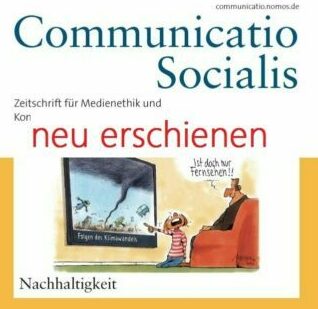
(English summary below)
Die aktuelle Ausgabe der Zeitschrift Communicatio Socialis versammelt diverse interessante Beiträge zum Thema Nachhaltigkeitskommunikation. Das Plädoyer darin: Nachhaltigkeit geht alle an, und auch Journalismus und Wissenschaft können sich nicht länger auf einen distanzierten Beobachterstatus zurückziehen.
Die Zeitschrift ist leider nicht frei lesbar. Für alle, die keinen Zugang zum Journal haben, sind hier drei Beiträge verfügbar – siehe hinterlegte Links:
„Plädoyer für eine bescheidene Weltverbesserung. Transformativer Journalismus und transformative Kommunikationswissenschaft“ (Michael Brüggemann)
„Nachhaltigkeit kultivieren. Öffentliche Kommunikation über Umwelt, Klima, nachhaltige Entwicklung und Transformation“ (Franzisca Weder)
„Transformation und Wiederverortung. Herausforderungen angesichts Klimanotstand und Artensterben“ (Torsten Schäfer)
Zur gesamten Ausgabe (Paywall): Communicatio Socialis (ComSoc), Jahrgang 55 (2022), Heft 2
English summary
The German-language journal Communicatio Socialis has, in its current issue, published a collection of interesting articles on sustainability communication. They agree that sustainability concerns everyone, and journalism and science can no longer retreat to the status of distant observers.
The journal is unfortunately not published with Open Access, so find here the English Summary of three of the articles:
Michael Brüggemann: A Plea for a Modest World Improvement. Transformative Journalism and Communication Science.
Global ecological crises confront journalism and communication studies with the question: How do we contribute to the ecological transformation of our society? Both professions hide behind the dogma of distanced and neutral world observation, thus avoiding the question of their own socio-ecological footprint: which consists not only of air travel and material consumption, but also in the choice of certain research questions, for or against intervening in the debates on the ecological transformation of our society. Transformative communication science could play reflexivity back into these debates, critical, solution-oriented, and always ready to think through its own bias and correct its own mistakes.
Franzisca Weder: Cultivating Sustainability. Public Communication on Environment, Climate, Sustainable Development and Transformation
This article outlines disciplinary roots, interdisciplinary approaches and research insights on climate, science, and sustainability communication. On this basis, it discusses the possibilities of differentiating sustainability communication – in particular from environmental and climate communication. This is followed by an attempt to theorize sustainability communication, which at the same time points to the necessity of understanding sustainability as a point of reference for ethical considerations, as a new (universal) value for communication and media studies themselves. This should be increasingly recognized in research, teaching, and method development, but also in university micro-politics, transfer services and commitment.
Torsten Schäfer: Transformation and Repositioning. Challenges in the Face of Climate Crisis and Species Extinction
Species extinction and the climate crisis demand from journalism and its theory to open up with regard to location, landscape and nature with new ethical concepts, role models and language habits. This essay outlines challenges and needs for action in the areas of media content, theory building, and practiced communication science. Impulses for the future are derived in particular from media ethnographic research on indigenous and traditional climate narratives in Scandinavia.